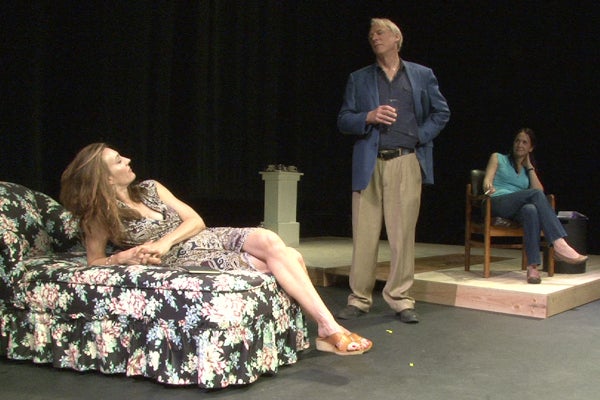|
View video here.
June 23, 2011
Truth takes a nasty turn: At Stanford, two plays explore memory and deception
Is truth malleable – or hard and inexorable? Different points of view unfold in Stanford Summer Theater performances of Harold Pinter's 'Old Times' and Seneca's 'Oedipus.' By Cynthia Haven

Courtney Walsh, Rush Rehm and Cristina Anselmo rehearse a scene from Harold Pinter's play Old Times. (Photo by Steve Fyffe / Stanford News Service) Ken Kesey famously said, "It's the truth, even if it didn't happen."
It's a timely reminder for the Stanford Summer Theater's presentations of two remarkable plays that explore truth, memory and deception: Nobel laureate Harold Pinter's Old Times and Ted Hughes' 1969 adaptation of Seneca's Oedipus.
Old Times plays at 8 p.m. Thursdays through Saturdays and 2 p.m. Sundays July 7-24 at the Pigott Theater. Oedipus plays at 8 p.m. Thursdays through Saturdays and 2 p.m. Sundays July 28-Aug. 14 at the Nitery Theater near the Old Union.
The annual festival also includes a free film series, a community symposium and a Stanford Continuing Studies course. The festival began earlier this spring with Dylan Thomas' Under Milk Wood and George Packer's Betrayed – plays that also explore memory.
According to drama and classics Professor Rush Rehm, the festival's artistic director, too often memory is "a tragedy to be ignored, or nostalgia to be sentimentalized." However, "if we care to think about it, we know that memory is a psychic battleground," he said.
The stakes are high: "Our future is bound up in what is remembered," he said.
Pinter's 1971 play is directed by Jeffrey Bihr and features Cristina Anselmo, Courtney Walsh and Rehm.
The plot: A husband, a wife and the wife's long-lost friend toy with the past – what may have happened, what they perhaps would have liked to have happened, and how the perception of truth can become as palpable as one's hand.
In the couple's converted farmhouse on a lonely seashore, the mysterious friend observes, "There are things I remember which may never have happened, but as I recall them so they take place." The husband recalls an earlier encounter decades before – or does he? "It's the truth. I remember clearly. … Of course we've met before," though it's not at all certain they did. In a subtle, and often funny, tug-of-war for possession of the wife, who occupies a peculiar blank in the center of the play, both attempt to reclaim her in the present by retrieving the past.
The truth is at the hard little rock at the heart of Oedipus – a truth that is without mercy. In Pinter's play, memory is plastic, malleable and flirts with the New Age bromide, "It's true if I think it's true." But the cliché is far from anodyne.
"This is a game that is destructive at the end," said Rehm of Old Times, a play in which the husband is targeted for psychological annihilation.
In Ted Hughes' gruesome rendering of the Roman playwright's bloody Oedipus, terrible truths long hidden overwhelm the present like a dark, inexorable tsunami. The haunted play deals with memory that cannot be forever repressed, cannot be placated, cannot be atoned for.
Oedipus, directed by Matt Moore, features guest artists Matthew DiBiasio, Courtney Walsh, Beth Deitchman and Tom Freeland.
Poet Hughes claimed the play is eternal, because "everybody must answer the sphinx." The real answer to the monster is not a word, however, but rather "the grisly stations, that Oedipus must go through from that moment."
Seneca takes its nihilism to a human endpoint: Oedipus turns upside down man's most fundamental and universal urge toward regeneration and life itself, which Jocasta repudiates at the end of the play.
Hughes, himself a haunted man ("the dead hate the living they only want to murder the living"), wrote in the introduction to his adaptation, "The radiant moral world of Sophocles is simply not here."
Seneca's Thebans "are a spider people, scuttling among hot stones," he wrote.
The philosopher and playwright Seneca is undergoing something of a revival. A mentor to Nero and enemy to Caligula, the Roman stoic lived at a nihilistic time. Hence, Oedipus is a vision limned at the absolute end of a world ("human scheming is futile worries are futile prayers are futile" and "there never were any gods there's only death").
Hughes argued that Seneca's Oedipus is "close to a mystery play, in the religious sense. … Nero's nightmare Rome, wide open to the depths, was wide open to such symbols and events also, as it groped toward salvation." Seneca calls Oedipus "the warrant of the gods … their latest attempt to walk on the earth" – hinting that even at the Roman Empire's darkest moment, a new historical spirit was stirring in the capital.
Tickets are available through the Stanford Ticket Office by phone at (650) 725-2787 or online. Ticket prices for Old Times are $25; $15 for seniors and students. For Oedipus, tickets are $20; $15 for seniors and students.
The festival's free film series includes Jacques Tourneur's Out of the Past, Alfred Hitchcock's Spellbound, Alain Resnais' La guerre est finie, Christopher Nolan's Memento and Costa-Gavras' The Music Box. Discussions led by Stanford faculty follow each screening. Films are shown at 7 p.m. Mondays July 11-Aug. 8 in Annenberg Auditorium.
In conjunction with the Continuing Studies Program, the festival offers an all-day community symposium, Stages of Memory, with lectures, scenes from memory plays, panel discussions and a catered lunch, from 9:30 a.m. to 5 p.m. Saturday, July 16, in Pigott Theater. Participants include Stanford faculty and the Stanford Summer Theater company. Click here to register.
-30-
|